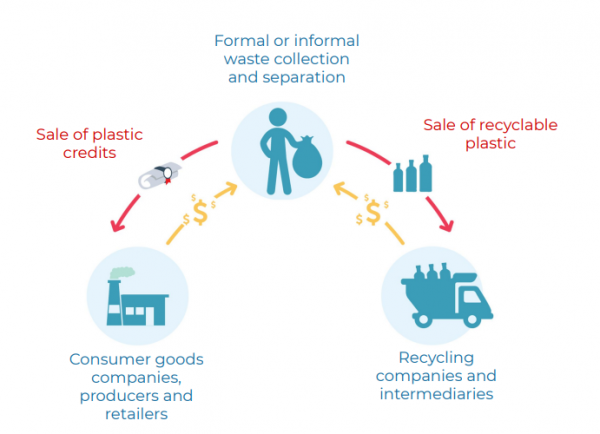1. What are plastic credits?
Plastic credits are measurable, verifiable, and transferable units representing a specific quantity of plastic that has been collected from the environment or recycled.[1]
Unlike carbon credits from plastic waste recycling operations, plastic credits are direct units, without the need through conversion calculations. The mechanism of action of plastic credits is almost identical to the Renewable Energy Certificate (REC).
2. The goal of plastic credits
A plastics credit is a certificate that can be bought by any public or private organisation. This organisation can use the plastic credit to take action and address plastic leakage along their supply chain, help finance projects that contribute to the fight against climate impacts and can help to reduce carbon emissions.[2]
Enterprises are aiming to collect, classify and recycle plastic waste in the production chain – supply of products using plastic and Plastic circulation is interested in social security, the environment and sustainable development are all suitable subjects to participate in the plastic credit project.
3. Background of promoting the implementation of plastic credit projects
- The international background
- In 2011, the United Nations Environment Programme (UNEP) highlighted plastic debris in the ocean as an emerging issue in the global environment in its 2011 yearbook.
- Since 2017, Break Free From Plastics Since 2017, Break Free From Plastics publishes a yearly audit revealing the top corporate plastic polluters.
- The pressure has led brands to adopt plastic waste reduction targets, often aligned to the “Plastic Pacts” of Ellen MacArthur Foundation Ellen MacArthur’s Foundation New Plastics Economy.
- A few pioneers (e.g., RePurpose, Plastic Bank) have successfully tested the concept, without a public mechanism to facilitate transparency.[3]
- In 2021, Verra has issued standards that allow the issuance of plastic credits, including plastic recovery credits and plastic recycling credits, so that it can be Trade on the voluntary
- National background
- The Law on Environmental Protection (amended) passed by the National Assembly on November 17, 2020 has introduced new regulations on solid waste management, including plastic waste in Kite 73 on “Reducing, reusing, recycling and treating plastic waste, preventing and combating ocean plastic waste pollution”[4]
- Directive No. 33/CT-TTg on strengthening the management, reuse, recycling, treatment and reduction of plastic waste
- Decision No. 1746/QD-TTg dated December 4, 2019 of the Prime Minister on the promulgation of the National Action Plan on ocean plastic waste management to 2030 clearly states the country’s vision and orientation for plastic waste management.
4. Benefits from participating in plastic credit projects
- For the buyer:
In addition to promoting sustainable development, the purchase of plastic credits demonstrates the company’s responsibility for their plastic products.
The benefits from purchasing plastic credits:
-
- It offsets your plastic production, giving your company the opportunity to become plastic neutral.
- Your company can claim sustainable practices without having to drastically change your day-to-day administration.
- Your investment will support projects that positively impact both the local community and the global community.
- It allows your company to be among those searching for a solution to plastic waste.[5]
- For the seller
For businesses that collect, treat and recycle plastic waste, they also have the opportunity to gain dual benefits from participating in the credit project. only plastic. Besides the sale of recyclable plastic waste products after classification (the main source of pre-existing revenue) to recycling companies and intermediaries, when participating in plastic credit projects , they can sell credits to manufacturing, retail and consumer goods companies use of plastic products in the supply chain of goods (additional revenue from plastic credit projects).

Figure 1: Dual benefits of taking plastic credits
Source: South Pole, 2021
5. How to start a plastic credit project
Plastic credits are a new type of credit in Vietnam and around the world. By April 21th, 2022, there were only 7 projects on plastic credits on Verra, of which 5 projects are in the process of appraisal and verification, 1 project is being registered and appraised, 1 project has been registered.
In order to start the development and implementation of the plastic credit project, it is necessary to carry out a project evaluation according to Verra’s very strict eligibility criteria. Currently, VNEEC is collaborating with South Pole to find potential plastic waste recovery and recycling activities to build the project and connect potential domestic collaborations and international customers demanding to buy plastic credits.
Vu Bich Ngoc
[1] https://www.southpole.com/sustainability-solutions/plastic-credits#:~:text=Plastic%20credits%20are%20measurable%2C%20verifiable,regional%20collection%20and%20recycling%20infrastructure.
[2] South Pole on Plastic Credits Project Development. South Pole’s presentation, March 2021
[3] Plastic Credits to Tackle Plastic Pollution: How to build our plastic projects portfolio? South Pole’s presentation, March 2021
[4] Law Jewel edge lip field 2020 (correct change).
[5] https://tontoton.com/plastic-credit-what-you-need-to-know-to-do-it-right/
11,267 views, 6

Tags:
Bài viết liên quan